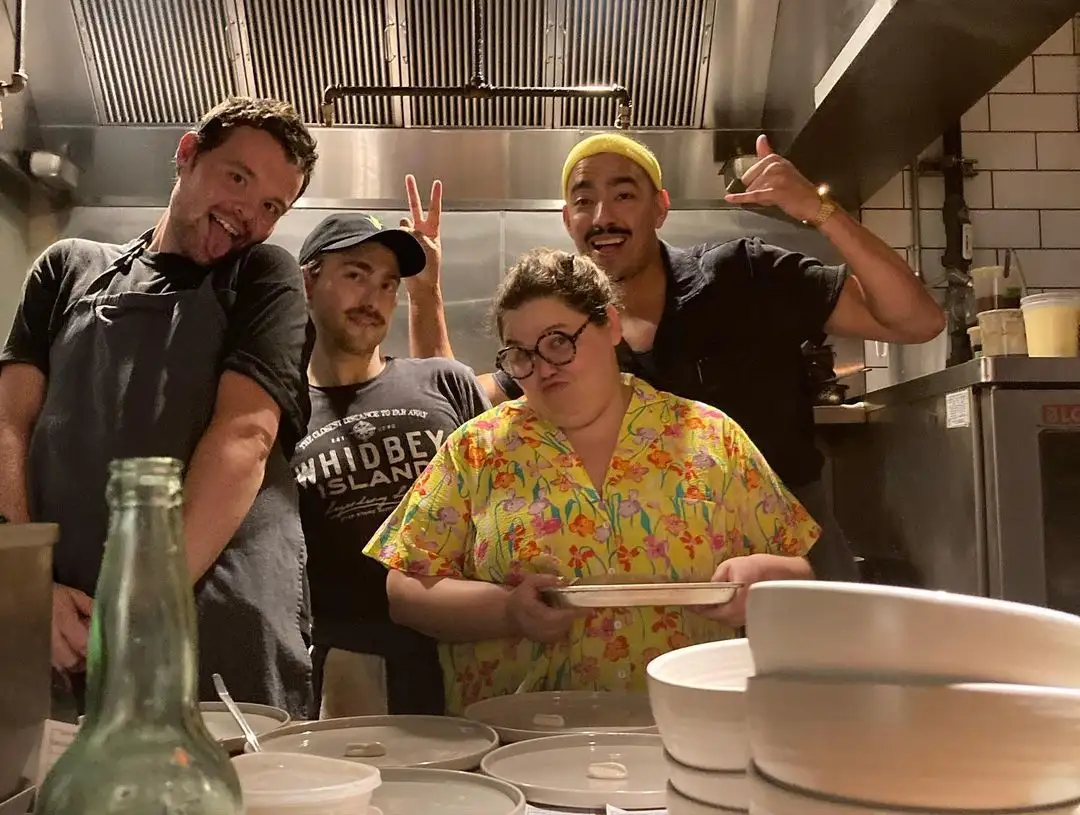Hospitality Now
How Chef Ana Castro is Combating Restaurant Burnout in Her Kitchen
April 25, 2023
The chef tells us why building a sustainable restaurant for her employees is so important to her.
“Why would you eat somewhere where people are being mistreated?”
Lengua Madre’s Executive Chef Ana Castro, 34, is creating a working environment that honors the dignity of its employees. Set in New Orleans Lower Garden District, the restaurant is casual fine dining with an affordable tasting menu. Chef Castro’s passion comes from a place where many restaurant narratives begin—entry level.
Yes, we’re going to eat. Yes, we’re going to eat what we like. It’s the perfect excuse to get together and share.
“‘Entry level workers’—You know how they say that. I don’t think the term is conducive to a good environment. Eating is such an act of communion, in general, and like sustenance,” she says.
Sharing is not only Lengua Madre’s theme but a cause. According to the US Department of Labor website under the Fair Labor Standards Act (FLSA), in Louisiana, the minimum wage for tipped employees is $2.13. At Lengua Madre, Chef Castro says everyone makes $8 an hour (the prep makes $18 an hour).
Chef Castro understands how grueling and inhumane working in restaurant culture can be, and the toll that kind of environment can take on one’s well being. She worked as a line cook for 5 years in New York and was getting $12 an hour. When she asked for a raise, she says, “it was $12.25.” Then came a crucial moment when she knew she needed a change.
“I had a horrible anxiety attack in the kitchen where I was working. I was tired, depressed, and broke living in New York. I drank a lot. I was anemic,” she says.
The 2023 James Beard nominated chef moved to New Orleans where her sister, Lydia, was attending college. She fell in love with the city and has been there for seven years.

Lengua Madre is small with just 36 seats. The restaurant accepts walk-ins based on availability, but making a reservation enables the chef to accommodate dietary restrictions when possible—a service that isn’t available for walk-ins. Guests pay $80 per person plus an optional wine pairing ($40). Chef Castro explains that check averages are “really, really controlled.” This enables her to plan for how much staff they’re going to need.
“The most we’ve ever done, cover-wise—it was one day, crazy, all hands on deck. It was around 67 covers.”
Lengua Madre’s staff is also small— one bartender, two servers, two part-time line cooks, one dishwasher and a rotating host station. Chef Castro describes the restaurant’s culture as “very townhall-y” but says it’s a delicate balance. For example, there’s no autograt (or auto gratuity). Instead, there’s a save-the-tip pool system, meaning when the cover count is low, management will take on an extra role. For example, the GM will work the floor. In the end, the goal is to split tips evenly (excluding management).
On the FAQs page of Lengua Madre’s website, it says, “A 5% surcharge is added to every guest's bill to provide fully paid health insurance and paid time off for all hourly employees.” While guests can opt out of the wellness fee, here is another example of how Lengua Madre is taking care of workers who are often invisible in the healthcare system. This theme of seeing the unseen extends to the restaurant’s homepage, where it says, “We acknowledge that we live in occupied Chitimacha Land.”
“The U.S. is a mess,” she says. “There is more of a focus on individualism, and much less on collective wellbeing, in this country.”

While Chef Castro was born in the U.S. (south Texas), she and her younger sister were raised in Mexico City. Her childhood reflects the nuances of many American families.
“I grew up with my grandmother because my parents split up when I was really young. My father’s mom took care of us from the point that I was four years old and my little sister was nine months old,” she says. “I think I left Mexico when I was 24 years old.”
Lengua Madre’s story begins at Chef Castro’s childhood home, where she came to understand food and community as a beautiful chaos.
“For me, every day, it was like we were going to see grandma, because I lived with her. We were the default place to host every single Christmas and family occasion. It was very chaotic at my house. That’s what I think of as a communion. Yes, we’re going to eat. Yes, we’re going to eat what we like. It’s the perfect excuse to get together and share.”
Lengua Madre is going back to the roots of small town dining, where service and comradery are not hierarchical but communal, like family. The name Lengua Madre (Mother Tongue) is as American as bodegas and beer. We share this American story that often begins beyond American shores and migrates to communities like New Orleans where mother tongues are a part of the city’s history and identity.
“The name came from the fact that, every time that I speak, someone listens to my accent and asks me if I’m Mexican or where I am from. I always say it’s my mother tongue,” Chef Castro says.
Dinkinish O'Connor writes the newsletter Sipping Lovely.
Visit Lengua Madre online at lenguamadrenola.com.

BentoBox Marketing & Commerce Platform
Deliver Smarter Hospitality
Want to stand out online, bring in more money, engage your diners, and streamline operations?
Recommended

Community
How North Carolina Became a Restaurant Powerhouse
June 24, 2024
The Tar Heel State is the nation’s fourth-biggest for new restaurant openings despite being ninth biggest in terms of population. Here’s what’s behind the growth.

The BentoBox 25
Supporting Women in Hospitality with Chef Elena Reygadas
May 14, 2024
Beyond shaping the city’s food scene at restaurants like Rosetta, the CDMX native has been an outspoken advocate for women pursuing culinary careers.

The BentoBox 25
Lewis Barbecue Brings High-Touch Hospitality to Texas BBQ
May 14, 2024
How the Charleston, SC restaurant group brings authentic Texas BBQ to a new environment.

